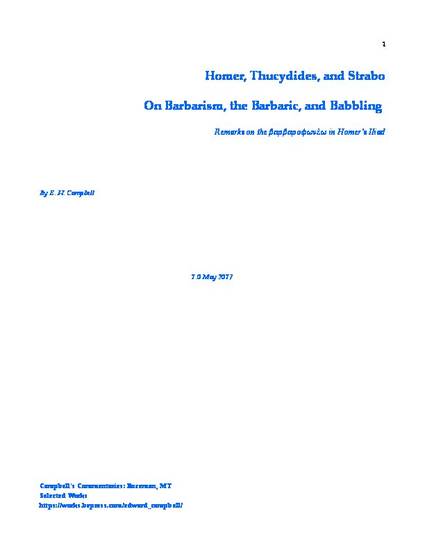
Unpublished Paper
Homer, Thucydides, and Strabo on Barbarism, the Barbaric, and Babbling
Campbell's Commentaries on Greek and Latin Literature
(2017)
Abstract
The alternative to this translation is: "Nastes once again led the babbling Carians." In Greek the first use of the word Barbarian appears in Iliad 2.867. A confusion has arisen out of the fact that the word βαρβαροφώνων could be understood in two possible syntactical relations. The word could be understood as a masc. gen. pl. of the adjective βαρβαρόφωνος modifying the fem. gen. pl. of Κάρα, a Carian, thus "the barbaric Carians."
On the other hand the word βαρβαροφώνων could be taken to be a masc. nom. sing. pres. act. part. of the verb βαρβαροφωνέω, to babel nonsense, modifying the masc. nom. sing. of Νάστης, Nastes, thus "Nastes, babbling nonsense." 23 pages.
Keywords
- Homer,
- Iliad,
- Greek,
- Philology,
- Classics,
- Barbarism,
- Thucydides,
- Strabo
Disciplines
Publication Date
Spring May 31, 2017
Citation Information
Edward H Campbell. "Homer, Thucydides, and Strabo on Barbarism, the Barbaric, and Babbling" Campbell's Commentaries on Greek and Latin Literature (2017) Available at: http://works.bepress.com/edward_campbell/67/
Creative Commons License

This work is licensed under a Creative Commons CC_BY International License.
